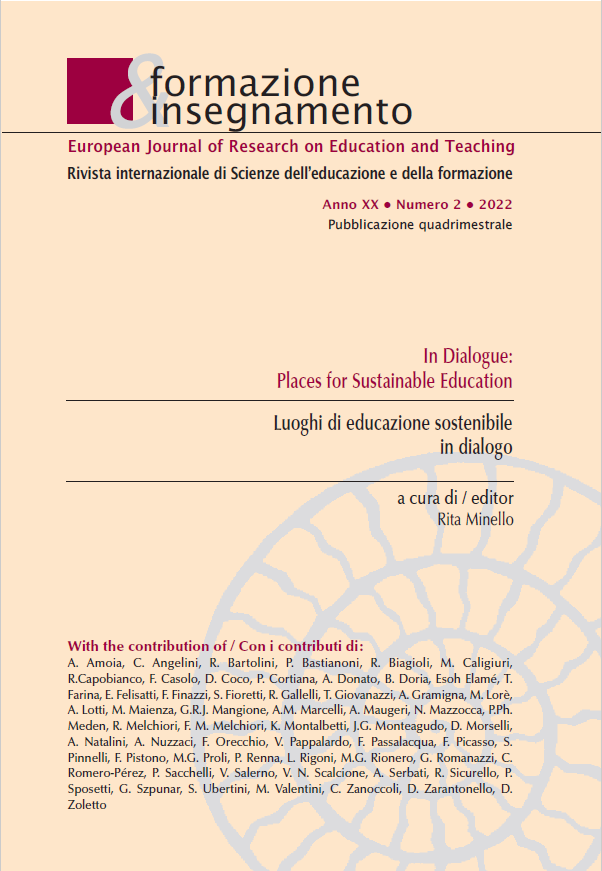Fostering Virtual Communities of Practice for the Professional Development of Support Teachers
DOI:
https://doi.org/10.7346/-fei-XX-02-22_05Keywords:
Inclusive skills, Teacher training, Specialization course, Reflective practices, Virtual communities of practiceAbstract
Being at the centre of the debate both in the academic world and in related associations, during the most difficult period of the Covid-19 emergency support teacher training has prompted a reflection on the relationship between training, teaching strategies, and learning environments (real or virtual). Support teachers certainly represent one of the key professional figures for an indispensable innovation of the welfare system. Such innovation shall unfold according to a promotional and regenerative perspective with confidence in the principle according to which the development of specific professional skills is necessary because it qualifies the scientific foundation of their educational interventions. Thus, the essay offers a contribution to the definition of the support teacher professional profile in the light of the legislative reforms that have regulated access to the profession, and of the new perspectives on virtual communities of practice. The latter enjoy intense collaboration or cooperation, which are considered very effective in terms of the social production of knowledge and the development of reflective-practical-operative and fruitful skills for the understanding of the teacher’s professionalization process.
References
Alessandrini, G. (2011). I processi di condivisione della conoscenza nelle organizzazioni: contesto e apprendimento. Riflessioni sistemiche, 5, 5–12. http://www.aiems.eu/archivio/files/rs_5_def.pdf (retrieved July 24, 2022)
Alessandrini, G. (2017). Comunità di Pratica e Società della conoscenza. Roma: Carocci.
Bertone, S., & Pedrelli, M. (2014). Il ruolo della comunità in un modello di valutazione professionale dei docenti. Rivista dell’istruzione, 6, 36–45.
Brown, R. (2001). The process of community-building in distance learning classes. Journal of Asynchronous Learning Networks, 5(2), 18–35. https://olj.onlinelearningconsortium.org/index.php/olj/article/view/1876 (retrieved July 24, 2022)
Calvani, A., Fini, A., Pettenati, M. C., & Sarti, L. (2005). Teorie CSCL e piattaforme Open Source per l’e-learning: verso un’integrazione. In M. Delfino, S. Manca, D. Persico, & L. Sarti (Eds.), Come costruire conoscenza in rete? (pp. 1–26). Ortona: Menabò.
EADSNE [European Agency for Development in Special Needs Education] (2011). La formazione docente per un sistema scolastico inclusivo in tutta Europa – Sfide ed opportunità. Odense: European Agency for Development in Special Needs Education. https://www.european-agency.org/sites/default/files/te4i-synthesis-report-it.pdf (retrieved July 24, 2022)
Falcinelli, F., & Laici, C. (2009). E-learning e formazione degli insegnanti: Un ambiente collaborativo per la costruzione condivisa della professionalità docente. Roma: Aracne Editrice.
Fiorin, I. (2012). Ricerca pedagogica e formazione degli insegnanti. Formazione & insegnamento, 10(1), 73–83. https://doi.org/10.746-fei-X-01-12/07
Fiorucci, M., & Moretti, G. (Eds.). (2019). Il tutor dei docenti neoassunti. Roma: RomaTrE-Press.
Hodges, C., Moore, S., Lockee, B., Trust, T., & Bond, A. (2020). The difference between emergency remote teaching and online learning. Educause Review, 27. https://er.educause.edu/articles/2020/3/the-difference-between-emergency-remoteteaching-and-online-learning (retrieved December 30, 2020)
Iori, V. (2018). Educatori e pedagogisti: Senso dell’agire educativo e riconoscimento professionale. Trento: Erickson.
Ligorio, M. B. (2002). Come si insegna, come si apprende. Roma: Carocci.
Perla, L. (2015). Lo sviluppo professionale dell’insegnante: Ipotesi per una modellistica in fieri. Mizar, 1, 9–22. https://doi.org/10.1285/i24995835v2015n1p9
Preece, J. (2000). Online communities: Designing usability, supporting sociability. Industrial Management and Data System, 100(9), 459–460. https://doi.org/10.1108/imds.2000.100.9.459.3
Schön, D. A. (1999). Il professionista riflessivo: Per una nuova epistemologia della pratica professionale. Bari: Dedalo.
Sicurello, R. (2019). L’educatore e il pedagogista: nuove professionalità per nuovi bisogni educativi. LLL, 15(34), 35–49. https://doi.org/10.19241/lll.v15i34.252
Sicurello, R., & Leoni, L. (2015). Il tirocinio tra scuola e università: la costruzione condivisa della professionalità docente. Formazione, Lavoro Persona, 5(15), 45–58. https://forperlav.unibg.it/index.php/fpl/article/view/220 (retrieved July 24, 2022).
Stahl, G., Koschmann, T., & Suthers, D. (2006). Computer-Supported Collaborative Learning: An Historical Perspective. In R. K. Sawyer (Ed.), Cambridge Handbook of the Learning Sciences (pp. 409–426). Cambridge, UK: Cambridge University Press.
Strano, A. (2013). Riconoscere le competenze per formare la professione docente: Il caso TFA. Formazione & insegnamento, 19(3), 223–231. https://ojs.pensamultimedia.it/index.php/siref/article/view/439 (retrieved July 24, 2022)
Tosi, A. (2014). eTwinning, nella formazione iniziale dei docenti: Dall’Europa una sperimentazione che vede coinvolte università, autorità, locali e unità eTwinning di 8 Paesi. INDIRE – Istituto Nazionale Documentazione, Innovazione e Ricerca Educativa. http://www.indire.it/content/index.php?action=read&id=1877 (retrieved September 30, 2015)
Varisco, B. (2002). Costruttivismo socio-culturale: Genesi filosofiche, sviluppi psico-pedagogici, applicazioni didattiche. Roma: Carocci.
Vuorikari, R. (2011). Sviluppo professionale degli insegnanti: Uno studio sulla pratica attuale. Bruxelles: Unità Europea eTwinning (CSS). https://www.etwinning.net/it/pub/newsroom/research-monitoring/teachers-professional-develop.htm (retrieved July 24, 2022)
Wenger, E. (2006). Comunità di pratica: Apprendimento, significato e identità. Milano: Cortina.
Zappaterra, T. (2014). Formare insegnanti specializzati per il sostegno in Italia: Uno sguardo dia-cronico. MeTis, 4(1), 1–12. https://doi.org/10.12897/01.00040
Downloads
Published
How to Cite
Issue
Section
License
Copyright (c) 2022 Rossana Sicurello

This work is licensed under a Creative Commons Attribution 4.0 International License.
Formazione & insegnamento is distributed under Attribution 4.0 International (CC BY 4.0).
For further details, please refer to our Repository & Archiving Policy, as well as our Copyright & Licensing Terms.





